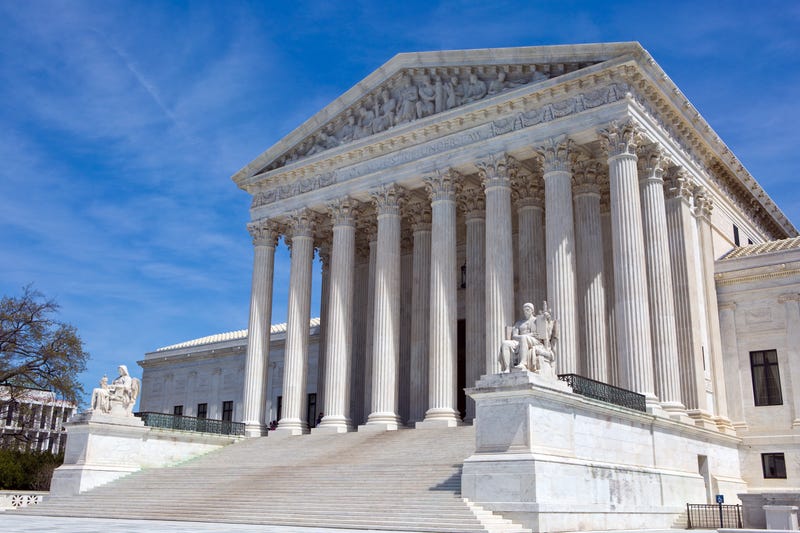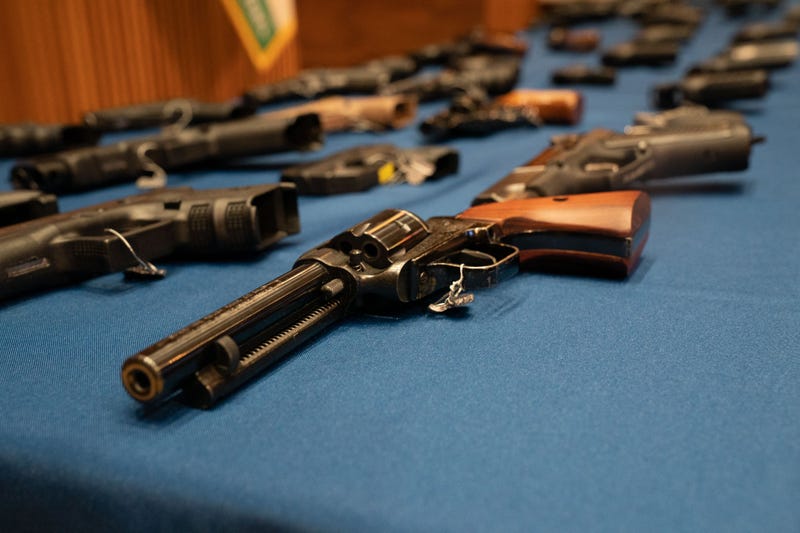
NEW YORK (1010 WINS/WCBS 880) -- The U.S. Supreme Court struck down New York state’s 100-year-old concealed gun law in a major expansion of gun rights that will make it easier for Americans to carry handguns outside their homes.
LISTEN TO 1010 WINS
The court announced the ruling Thursday. It's the high court's first major gun decision in more than a decade.
In their 6-3 decision, the justices struck down a New York law requiring people to demonstrate a particular need for carrying a gun in order to get a license to carry one in public. The justices said the requirement violates the Second Amendment right to “keep and bear arms.” New Jersey, Massachusetts and a handful of other states have similar laws.
Justice Clarence Thomas wrote for the majority that the Constitution protects "an individual’s right to carry a handgun for self-defense outside the home.”
In a concurring opinion, Justice Brett Kavanaugh noted that the court's decision didn't bar states from imposing licensing requirements to carry a handgun, like requiring that someone get fingerprinted, undergo a mental health records check or undergo firearms training, or from barring people from carrying guns in sensitive places such as schools and government buildings.
The decision, he said, would put New York on relatively the same ground as 43 other states: If an ordinary person applies for a license to carry a handgun, and meets eligibility standards, they can't be turned down at the discretion of the licensing officer, or because they can't show a compelling need to defend themselves.
In a dissent joined by his liberal colleagues, Justice Stephen Breyer focused on the toll taken by gun violence. “Since the start of this year alone (2022), there have already been 277 reported mass shootings—an average of more than one per day,“ Breyer wrote.
New York City officials insisted that nothing would change immediately, noting that the high court sent the case back to a lower court for further proceedings that could iron out implementation details. But the decision instantly raised fears among supporters of New York's handgun limits, saying that loosening the rules could create a marketplace for handguns that now barely exists in the state.
The justices’ decision is expected to ultimately allow more people to legally carry guns on the streets of the nation’s largest cities, including New York City.
The decision has no immediate impact on other laws, including rules on background checks and age requirements for gun purchases. Gun licensing remains in place.
The ruling means the city and state will have to define where guns cannot be brought, so called “sensitive places.” The question facing local officials is what those places are, as the court has left open the avenue for localities to fashion laws to ban concealed weapons in certain places.
Gov. Kathy Hochul immediately reacted, calling it “frightful in its scope.” She said she’s “prepared to call the legislature back into session to deal with this.”
Hochul said her office is working on legislation in response to the ruling that would focus on restricting guns in the “sensitive locations.”
“We've been in contact with the leadership,” the governor said. “We're just looking at dates. Everyone wants a little bit of time to digest this, but I will say we are not powerless in this situation. We're not going to cede our rights that easily.”
“The language we’re reading is shocking,” Hochul said of the court's decision. “Today the Supreme Court is setting us backwards in our effort to protect families and stop gun violence.”
“This could place millions of New Yorkers in harm’s way,” the governor added, saying she doesn’t want people entering places like the subway system with concealed weapons.
“This decision isn’t just reckless it’s reprehensible. It’s not what New Yorkers want. And we should have the right of determination of what we want to do in terms of our gun laws in our state,” Hochul said, denouncing “the gun culture that has now possessed everyone up to the Supreme Court.”
Former Gov. Andrew Cuomo also released a statement calling the decision "another devastating setback in our fight against gun violence." The ex-governor said "because of this ruling, we're now back to where we were in 1910," and he urged Congress to act with "assault weapon and high capacity magazine bans."
The challenge to the New York law was brought by the New York State Rifle & Pistol Association, which describes itself as the nation’s oldest firearms advocacy organization, and two men seeking an unrestricted ability to carry guns outside their homes.
Backers of New York’s law had argued that striking it down would ultimately lead to more guns on the streets and higher rates of violent crime. The decision comes at a time when gun violence already on the rise during the coronavirus pandemic has spiked anew.
In most of the U.S., gun owners have little difficulty legally carrying their weapons in public. But that had been harder to do in New York and several other states.
New York state’s law, in place since 1913, said that to carry a handgun outside the home, a person applying for a license has to demonstrate “proper cause,” an actual need to carry the weapon.
The law did not define what proper cause meant, and it gave local officials — often a police department — discretion on whether to issue a license. In practice, that meant most applicants had to show a need that went beyond routine public safety concerns, like being in a profession that put them at special risk.
In New York City, few people beyond retired law enforcement officers and armed guards could get a license to carry a handgun.

President Joe Biden released a statement saying he was “deeply disappointed” by the ruling.
“Since 1911, the State of New York has required individuals who would like to carry a concealed weapon in public to show a need to do so for the purpose of self-defense and to acquire a license,” Biden said.
“More than a century later, the United States Supreme Court has chosen to strike down New York’s long-established authority to protect its citizens. This ruling contradicts both common sense and the Constitution, and should deeply trouble us all,” the president said.
Mayor Eric Adams, who had told 1010 WINS that the anticipated Supreme Court decision “keeps me up at night,” issued a statement saying the ruling “will put New Yorkers at further risk of gun violence.”
“We have been preparing for this decision and will continue to do everything possible to work with our federal, state, and local partners to protect our city,” the mayor said. “Those efforts will include a comprehensive review of our approach to defining ‘sensitive locations’ where carrying a gun is banned, and reviewing our application process to ensure that only those who are fully qualified can obtain a carry license. We will work together to mitigate the risks this decision will create once it is implemented, as we cannot allow New York to become the Wild West.”
At a press conference scheduled after the ruling, Adams said, “while we’re still analyzing decision, we can say with certainty this decision has made every single one of us less safe from gun violence.”
The mayor said he’ll be working with partners in government and figure out what the decision means for the “sensitive locations” where people still couldn’t carry guns.
Adams raised the specter of everyday disputes turning into shootouts in New York’s crowded streets and subways. He suggested that police officers would face greater danger, as well as a greater burden of distinguishing between legal and illegal guns in public places.
“This complicates matters,” Adams said. “But we’re going to continue to pursue those who are carrying illegal firearms.”
NYPD Commissioner Keechant Sewell, who joined Adams, said “nothing changes today” and that residence permits do not automatically convert to carry permits. Anyone carrying an illegal gun will be arrested, she said.
New York City Council Speaker Adrienne Adams planned to schedule a vote asking state lawmakers to ban people from carrying handguns in any place containing more than 10,000 people per square mile, or anywhere within 1,000 feet of mass transit systems, hospitals, parks, government buildings, schools, churches, cemeteries, banks, theaters bars, libraries, homeless shelters and courts — effectively the whole metropolis.
Manhattan District Attorney Alvin Bragg also released a statement, saying the court’s decision “severely undermines public safety not just in New York City, but around the country.”
“While the Court has now made it more difficult to limit the number of guns in our communities, I am committed to doing everything in my power to fight for the safety everyone in this city deserves, and we have been preparing for this decision for weeks,” Bragg said. “New York still has some of the toughest gun laws in the country on the books, and we will continue to use these statutes to hold accountable those who commit gun violence.”
Bragg said his office is “analyzing this ruling and crafting gun safety legislation that will take the strongest steps possible to mitigate the damage done today.”
The court's decision comes as Congress appeared set Thursday to approve modest gun law changes. The measure would toughen background checks for the youngest gun buyers, keep firearms from more domestic violence offenders and help states implement “red flag” laws that make it easier for authorities to take weapons from people adjudged dangerous. It would also fund local programs for school safety, mental health and violence prevention.
Gun-control advocates have noted that New York currently has among the nation’s lowest rates of firearm deaths, including from suicides: 3.9 deaths per 100,000 people in 2019 and 5.3 deaths per 100,000 people in 2020.
Manhattan, a symbol of urban America, had the lowest rate of gun deaths in the state with 1.7 deaths per 100,000 in 2019, according to the Johns Hopkins Center for Gun Violence Solutions.
The Associated Press contributed to this report.



